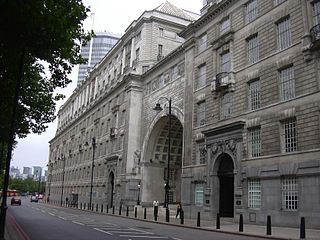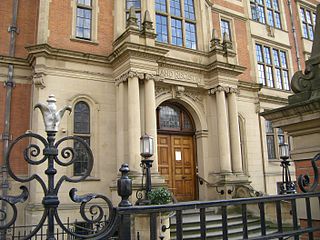Related Research Articles

The Statute of Frauds (1677) was an Act of the Parliament of England. It required that certain types of contracts, wills, and grants, and assignment or surrender of leases or interest in real property must be in writing and signed to avoid fraud on the court by perjury and subornation of perjury. It also required that documents of the courts be signed and dated.
A legal remedy, also referred to as judicial relief or a judicial remedy, is the means with which a court of law, usually in the exercise of civil law jurisdiction, enforces a right, imposes a penalty, or makes another court order to impose its will in order to compensate for the harm of a wrongful act inflicted upon an individual.

English trust law concerns the protection of assets, usually when they are held by one party for another's benefit. Trusts were a creation of the English law of property and obligations, and share a subsequent history with countries across the Commonwealth and the United States. Trusts developed when claimants in property disputes were dissatisfied with the common law courts and petitioned the King for a just and equitable result. On the King's behalf, the Lord Chancellor developed a parallel justice system in the Court of Chancery, commonly referred as equity. Historically, trusts have mostly been used where people have left money in a will, or created family settlements, charities, or some types of business venture. After the Judicature Act 1873, England's courts of equity and common law were merged, and equitable principles took precedence. Today, trusts play an important role in financial investment, especially in unit trusts and in pension trusts. Although people are generally free to set the terms of trusts in any way they like, there is a growing body of legislation to protect beneficiaries or regulate the trust relationship, including the Trustee Act 1925, Trustee Investments Act 1961, Recognition of Trusts Act 1987, Financial Services and Markets Act 2000, Trustee Act 2000, Pensions Act 1995, Pensions Act 2004 and Charities Act 2011.

The Law of Property Act 1925 is a statute of the United Kingdom Parliament. It forms part of an interrelated programme of legislation introduced by Lord Chancellor Lord Birkenhead between 1922 and 1925. The programme was intended to modernise the English law of real property. The Act deals principally with the transfer of freehold or leasehold land by deed.

Lloyds Bank plc v Rosset[1990] UKHL 14 is an English land law, trusts law and matrimonial law case. It specifically deals with the translation into money of physical contributions from a cohabitee or spouse, under which its principles have been largely superseded.
Mortgage Corporation v Shaire [2001] Ch 743 is a widely reported English land law case relating to the Trusts of Land and Appointment of Trustees Act 1996. Such a status specifically flowed from an instance of non est factum mortgage fraud where the mortgage lender and the defrauded co-owner wished to accelerate and delay sale respectively. The case is relevant to matrimonial law in that the respective equitable shares in the home awarded to Mrs Shaire and Mr Fox in 1987 matrimonial proceedings were never defined and it fell to the court to define these.

Daulia Ltd v Four Millbank Nominees Ltd [1977] is an English contract law case, concerning unilateral contracts, and when embarking on the performance of an act for which an offer is open, at what point the offer may be withdrawn. In particular, Goff LJ observed that there would be a duty to not prevent full performance of terms in a unilateral offer, once performance had begun.
Cobbe v Yeoman's Row Management Ltd[2008] UKHL 55 is a House of Lords case in English land law and relates to proprietary estoppel in the multi-property developer context. The court of final appeal awarded the project manager £150,000 on a quantum meruit basis for unjust enrichment because Yeoman's Row had received the benefit of his services without paying for that. The court refused to find or acknowledge a binding contract, prior arrangement with a third party or promise, overturning a £2m award on the basis of a possible lien arising from a promise over the property. The court found a non-binding agreement in principle, entirely subject to the owner's final say to take into account for example their view of the market; this was the basis on the facts on which the parties were proceeding.

Williams & Glyn's Bank v Boland [1980] is a House of Lords judgment in English land and trusts law on an occupier's potentially overriding interests in a home.

City of London Building Society v Flegg[1987] UKHL 6 is an English land law case decided in the House of Lords on the relationship between potential overriding interests and the concept of overreaching.

Hussey v Palmer [1972] EWCA Civ 1 is an English trusts law case of the Court of Appeal. It concerned the equitable remedy of constructive trusts. It invokes the equitable maxim, "equity regards the substance and not the form."

Yaxley v Gotts [1999] is an English contract law case with specific relevance to formalities in land law. The case deals with whether section 2 of the Law of Property Act 1989 which requires that contracts be in writing prevents an oral contract from taking effect where otherwise an interest would arise by proprietary estoppel, i.e. whether the provision in subsection 5 on resulting, implied or constructive trusts covers also proprietary estoppel.
The creation of express trusts in English law must involve four elements for the trust to be valid: capacity, certainty, constitution and formality. Capacity refers to the settlor's ability to create a trust in the first place; generally speaking, anyone capable of holding property can create a trust. There are exceptions for statutory bodies and corporations, and minors who usually cannot hold property can, in some circumstances, create trusts. Certainty refers to the three certainties required for a trust to be valid. The trust instrument must show certainty of intention to create a trust, certainty of what the subject matter of the trust is, and certainty of who the beneficiaries are. Where there is uncertainty for whatever reason, the trust will fail, although the courts have developed ways around this. Constitution means that for the trust to be valid, the property must have been transferred from the settlor to the trustees.

English land law is the law of real property in England and Wales. Because of its heavy historical and social significance, land is usually seen as the most important part of English property law. Ownership of land has its roots in the feudal system established by William the Conqueror after 1066, and with a gradually diminishing aristocratic presence, now sees a large number of owners playing in an active market for real estate.
Bristol & West Building Society v Henning [1985] EWCA Civ 6 is an English land law case that holds a person can consent to give up the right to an overriding interest in land, that will bind third parties, such as banks, that purchase a property. Although dealing with unregistered land, it is equally applicable in the case of registered land and now falls under the Land Registration Act 2002.

Tinsley v Milligan[1993] UKHL 3 is an English trusts law case, concerning resulting trusts, the presumption of advancement and illegality.

Pennington v Waine[2002] EWCA Civ 227 is an English trusts law case, concerning the requirements for a trust to be properly constituted, and the operation of constructive trusts. The case represents an equitable exception to the need for a complete transfer of property in law.

National Provincial Bank Ltd v Ainsworth [1965] is an English land law and family law case, concerning the quality of a person's interest in a home when people live together, as well as licenses in land.

Prest v Petrodel Resources Ltd[2013] UKSC 34, [2013] 2 AC 415 is a leading UK company law decision of the UK Supreme Court concerning the nature of the doctrine of piercing the corporate veil, resulting trusts and equitable proprietary remedies in the context of English family law.

Registered land in English law accounts for around 88 per cent of the total land mass. Since 1925, English land law has required that proprietary interests in land be registered, except in cases where it is necessary to protect social or family interests that cannot reasonably be expected to be registered. English law also runs a parallel system for around 12 per cent of land that remains unregistered.